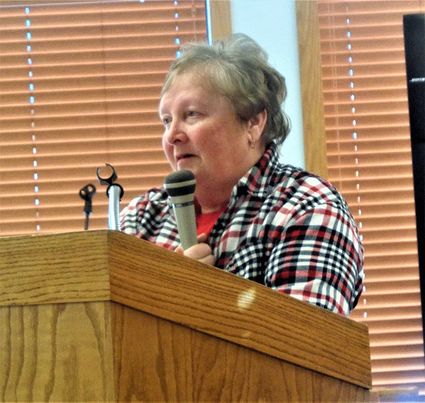Cancer Support Group speaker presented "Cancer X 3"
January 24, 2018

Judy Handstede, of Havre, spoke at the January meeting of the Chinook Cancer Support Group. Handstede is a survivor of breast cancer, first diagnosed 15 years ago. Within the past year two of her three adult daughters were diagnosed with different varieties of breast cancer. Her presentation focused on changes in cancer treatment and how a cancer survivor can be one of the best supports a patient can have.
Each month the Cancer Support Group in Chinook meets to hear a topic related to the challenges surrounding cancer from survivors, caregivers, researchers, medical professionals and patients. Judy Handstede, a cancer survivor from Havre, recently shared her story of her survival after an initial diagnosis of breast cancer 15 years ago. Last year two of her three adult daughters were diagnosed with breast cancer casting Judy now as a caregiver and survivor. She shared some of the challenges of dealing with her own cancer, being a caregiver to her daughters and how cancer treatment has changed in a decade and a half. The talked about "Cancer X 3."
Handstede first thanked the Chinook group for their role in supporting the Gift of Life Housing Center in Great Falls. The Center provides donor-supported housing to individuals who live outside Great Falls and need a place to stay while receiving treatment at Benefis Health System. She said, "Having this housing option removes one more worry for families dealing with cancer treatments." She had once-a-week chemo infusion in Great Falls for 18 months, traveling from Havre each week.
Handstede said, "Prior to the actual diagnosis of my cancer I had repeated returns to redo mammograms and biopsies. It became routine to be called back for retesting." In 2018 her physician was going on vacation. Judy told her doctor, "You can tell me the results when you get back." She assumed it would be another routine finding. Two days after that mammogram another physician called Judy and said, "You and your husband need to come to my office immediately." She was diagnosed with HER 2 Positive breast cancer.

A course of treatment was prescribed, following surgery, that included the weekly chemo infusions. She explained, "I was in an experimental study, overseen by a clinic in Los Angeles, using Herceptin." Two months after her chemo treatments ended, Herceptin was approved for treatment of the type cancer she had. Prior to the new chemo, nothing had been effective to treat that particular cancer.
Handstede and her husband have lived in Havre for about 30 years. They both grew up in Canada and ended up in Montana through her husband's work. She was a professional skater in Canada and took up snow skiing after moving to the Havre area. She said, "My treatment went very well with only a few negative reactions on my part. I continued to work my job four days a week and skied all through the winter." Regular checkups show she remains cancer free.
Cancer in
Judy Handstede's family
Handstede cited a Cancer Society statistic that breast cancer affects one of every eight people. When two of her daughters were diagnosed with breast cancer in 2017 the family was shocked and it certainly defied the statisics. She said, "We had never had any cancer in our family. Then in a short period of time two of my sisters died from cancer and two of my three daughters were diagnosed with breast cancer." She added that the type of breast cancer her daughters have is not the same as what she had.
Switching to the role of caregiver has been a sometimes difficult task for Judy. She explained that her husband was always there, as was the rest of her family, during her dealing with cancer. "But," she added, "everyone reacts differently to a cancer diagnosis. Some patients take an immediate stance they will fight the disease successfully, others lose hope quickly. My daughters reacted differently and I try to be there for them when they need my help but also try not to intrude."
She noted, "In the 15 years since I was first diagnosed, cancer research has made great strides and how patients are treated and supported has also changed." She told about her husband attending medical appointments with her and how they would have "follow up sessions" at home to discuss what the doctors said. Judy added "If you're married you know spouses don't always hear the same things."
Now, fifteen years later, one of Judy's daughters has a 'cancer navigator' who attends all doctor-patient conferences, treatments and other medical-related events to take notes and help assure the daughter knows what is going on. The navigator discusses notes and sends them home with the patient so there is less misunderstanding about the treatment or patient care. Judy said, "My relatives tell me that in Canada there are programs to train a spouse to be a cancer navigator. Having that help for the patient is a major step toward helping with proper treatment and care."
Sensing that there might be questions in the audience about genetic causes of the cancer she and her daughters encountered, Handstede said, "None of us had the same sorts of cancer. There is no genetic relationship the doctors can find." She went on to explain that her grandchildren are now being tested. She said, "There are certain markers that may indicate the potential for cancer. Just because you have the marker doesn't mean you definitely will have cancer." She said genetic testing of children of cancer patients means doctors will have a heightened sense of awareness about the potential for cancer and typically do more rigorous screenings once a child of a cancer patient reaches age 30.
Defining a role as a caregiver
Earlier Handstede had asked for a show of hands of cancer survivors in the audience. She said, "I believe cancer survivors can be invaluable to a person diagnosed with cancer. The best thing a caregiver can do is give hopeful and realistic encouragement." She added, "There is a tremendous amount of information, especially on the internet, about cancer and the prospects for survival. For the most part information is good but too much can cause patients to be depressed about their condition if all they learn is negative or overly optimistic comments can result in false hope." A caregiver who is a survivor can often bring a calming effect to a challenging situation.
Handstede summed her presentation noting, "None of us know what medical miracles are forthcoming." Citing her own experience with an experimental drug that is now used to treat a once non-treatable variation of cancer, she urged her audience to "continue to be there for each other and for future patients who are diagnosed with cancer."

